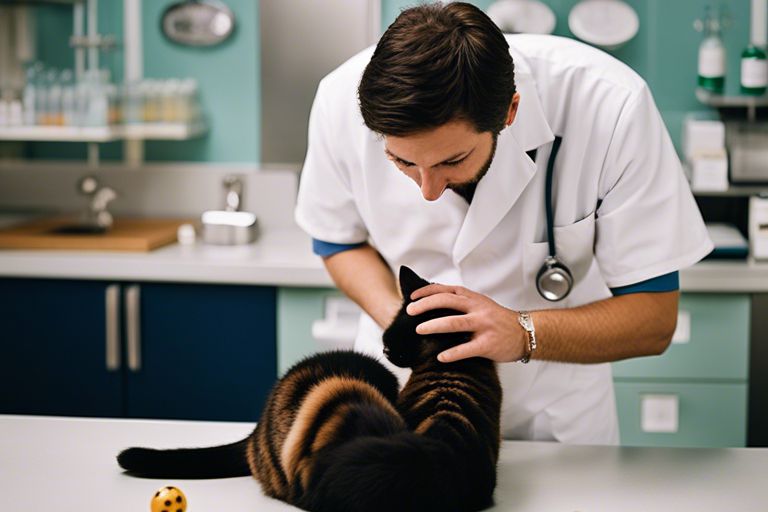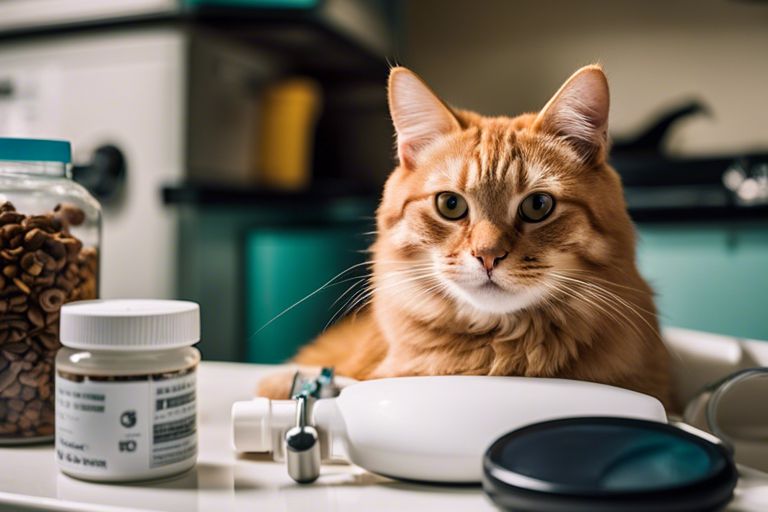Have you noticed that your cat’s belly seems unusually swollen or bloated? This can be a cause for concern, as a bloated belly in cats can be a sign of a serious health issue. It’s important to pay attention to this symptom and take action if you notice it in your cat. A bloated belly in cats can be caused by a variety of factors, including intestinal parasites, kidney disease, or heart failure. It’s crucial to have your cat examined by a veterinarian as soon as possible to determine the underlying cause and provide appropriate treatment. In this blog post, we will discuss the common reasons why cats develop a bloated belly and what steps you can take to ensure your cat’s health and well-being.
Key Takeaways:
- Consult a veterinarian: A bloated belly in cats can be a sign of a serious health issue, so it is important to seek professional guidance from a veterinarian.
- Possible causes: There are several potential reasons for a cat to have a bloated belly, including intestinal parasites, organ failure, or dietary issues.
- Monitor for additional symptoms: In addition to a bloated belly, watch for changes in appetite, lethargy, vomiting, or diarrhea, as these may provide further clues to the underlying cause.
- Diet and nutrition: It’s important to ensure your cat is eating a balanced diet and not consuming foods that could contribute to bloating, such as excessive amounts of carbohydrates or dairy products.
- Regular check-ups: Schedule regular veterinary check-ups for your cat to maintain their overall health and catch any potential issues early on.
Common Causes of Feline Bloating
The bloated belly in your feline friend can be concerning, but there are several common causes that may be contributing to this issue. It’s important to understand the potential reasons behind your cat’s bloating so that you can take appropriate action.
Digestive Issues
If your cat is experiencing digestive issues, such as gas or constipation, it can lead to bloating. Your cat’s digestive system may struggle to break down food properly, leading to gas buildup and discomfort. In some cases, dietary changes or certain medications may be necessary to help alleviate these digestive issues and reduce bloating in your cat.
Parasitic Infections
Parasitic infections, such as worms, can also cause your cat’s belly to become bloated. These parasites can disrupt your cat’s digestive system and lead to fluid retention, causing their belly to appear swollen. It’s important to have your cat regularly checked for parasites and to follow your veterinarian’s recommended deworming schedule to prevent and treat these infections.
Fluid Accumulation (Ascites)
Fluid accumulation in the abdominal cavity, known as ascites, can cause your cat’s belly to become bloated. This condition can be a sign of a serious underlying health issue, such as liver or heart disease. If your cat’s belly appears swollen and they are displaying other concerning symptoms, such as decreased appetite or difficulty breathing, it’s crucial to seek veterinary attention immediately. Ascites can indicate a potentially life-threatening condition that requires prompt medical care.
Overeating and Dietary Habits
If your cat has been overeating or consuming an excessive amount of food, it can lead to a distended belly. Pay attention to your cat’s dietary habits and ensure they are not consuming more food than necessary. Additionally, certain dietary ingredients may not agree with your cat’s digestive system, leading to bloating. Consider discussing your cat’s diet with your veterinarian to ensure it is appropriate for their individual needs and does not contribute to bloating.
Symptoms and Diagnosis
For a cat with a bloated belly, the symptoms may vary depending on the underlying cause. However, some general signs to look out for include a distended abdomen, lack of appetite, vomiting, diarrhea, and difficulty breathing. If you notice any of these symptoms in your cat, it is essential to seek veterinary care for a proper diagnosis and treatment.
Recognizing the Signs of Bloating in Cats
When looking for signs of bloating in your cat, pay attention to their behavior and appearance. A bloated belly may appear swollen and feel firm to the touch. Your cat may also display signs of discomfort, such as restlessness or difficulty finding a comfortable position. Additionally, if you notice your cat having difficulty breathing or showing signs of distress, it is crucial to seek immediate veterinary care.
When to Seek Veterinary Care
If you notice your cat displaying any of the symptoms associated with bloating, it is essential to seek veterinary care promptly. Bloating in cats can be a sign of a severe underlying condition such as fluid accumulation in the abdomen, gastrointestinal blockage, or organ dysfunction. Prompt diagnosis and treatment are crucial to addressing the issue and preventing any potential complications.
Diagnostic Tests for Bloating
When you take your cat to the veterinarian for a bloated belly, they will likely perform a series of diagnostic tests to determine the underlying cause. These tests may include blood work, X-rays, ultrasounds, and in some cases, a sample of the abdominal fluid for analysis. The results of these tests will help your veterinarian pinpoint the cause of your cat’s bloating and develop an appropriate treatment plan.
Treatment and Management
Not sure why your cat has a bloated belly? You can find more information on possible causes and symptoms here. Once you have a diagnosis from your veterinarian, it’s important to understand how to treat and manage the condition effectively.
Medical Interventions for Bloating
If your cat is experiencing bloating due to an underlying medical condition, your veterinarian will recommend appropriate treatment options. This may include medication, surgery, or other medical interventions to address the root cause of the bloating. It’s crucial to follow your vet’s instructions carefully and administer any prescribed medication as directed. Regular follow-up visits will also be necessary to monitor your cat’s progress and adjust the treatment plan if needed.
Dietary Adjustments and Preventative Measures
It’s essential to ensure that your cat’s diet is well-balanced and suited to their specific nutritional needs. Your veterinarian may recommend dietary adjustments to alleviate bloating, such as switching to a specialized diet or incorporating certain supplements. Additionally, make sure your cat has access to fresh, clean water at all times, and monitor their food intake to prevent overeating. Preventative measures include minimizing stress and providing ample opportunities for exercise to promote digestive health and overall well-being.
Caring for a Cat with Chronic Bloating Issues
If your cat has chronic bloating issues, consistent veterinary care and monitoring are crucial. You may need to make long-term modifications to your cat’s diet and lifestyle to manage their condition effectively. This could involve ongoing medical treatment, dietary adjustments, and close observation of your cat’s symptoms. Regular communication with your veterinarian will help ensure that your cat receives the best possible care and that any changes in their condition are addressed promptly.

Why does my cat have a bloated belly?
Upon reflecting on the possible reasons behind your cat’s bloated belly, it is important to consider factors such as diet, parasites, or underlying health issues. A diet high in carbohydrates or poor quality ingredients can lead to gastrointestinal discomfort and bloating in cats. Additionally, internal parasites such as worms can also cause bloating. It is crucial to consult with a veterinarian to rule out any serious health problems that may be causing your cat’s bloated belly. By addressing these potential causes, you can ensure the well-being and comfort of your feline companion.
FAQ
Q: Why does my cat have a bloated belly?
A: A bloated belly in cats can be caused by a variety of reasons, including gastrointestinal issues, dietary indiscretion, parasites, fluid retention, or even more serious underlying health conditions. It is important to consult a veterinarian to determine the cause and appropriate treatment.
Q: What are the common symptoms of a bloated belly in cats?
A: Common symptoms of a bloated belly in cats may include abdominal distention, discomfort, reduced appetite, vomiting, diarrhea, and lethargy. It is important to monitor your cat’s behavior and seek veterinary attention if you notice these symptoms.
Q: How can I prevent my cat from getting a bloated belly?
A: To prevent your cat from getting a bloated belly, it is essential to provide a balanced diet, ensure proper portion control, and avoid feeding your cat table scraps or foods that are known to cause gastrointestinal upset. Regular veterinary check-ups and preventative care, such as deworming, can also help maintain your cat’s overall health and prevent bloating.

Jayley, a devoted cat enthusiast, also writer for other cat blog as well. She aims to dedicated to providing comprehensive information, insights, and advice on everything you’d ever want to know about our whiskered companions.
